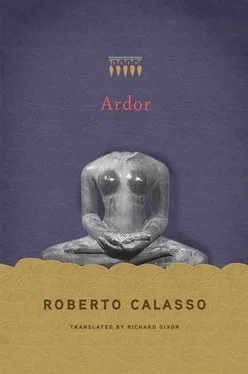dhā- (“establish,” “place”)
dharma (“law,” “order”); see also law; world order
dhī (“thought,” “vision,” “contemplation”)
dhiṣṇya (fires)
dhūrv- (“to injure”)
dhyāna (“meditation”); see also meditation
digital mode of thought; see also substitution; substitutive thinking
dīkṣā (“consecration,” “initiation”); see also consecration
dīkṣita (“consecrated one”)
Dionysius of Halicarnassus
Dionysus
Dioscuri
Diotima
Dīrghatamas, Māmateya Aucathya
discontinuity
discernment ( vijñāna )
discrete, continuum and
disputation; see also brahmodya ; dog, curled-up
divine, divinity; see also gods
dog, curled-up
Don Giovanni
doubt
dream
duality
duḥkha (“pain”)
Dumézil, Georges
Dumont, Louis
Dumont, Paul-Émile
Durkheim, David Émile
Earth, earth (Pṛthivī)
Eckhart, Meister
Eggeling, Julius
egoity ( ahaṃkāra ); see also I ( aham )
Egypt
eídōlon (“simulacrum”); see also simulacrum
ejaculation; see also semen
Elea
elements; see also Earth; fire(s); water, waters
Eleusinian Mysteries
Elohim
embryo
Empedocles
empires
energy
enigma
Enlightenment
Epistle to the Hebrews
equivalences; see also bandhu ; connections; correspondences; nexus; sampad; upaniṣad
Eros
eros , erotica; see also ejaculation; semen
error
escape
etiquette
Eucharist; see also Last Supper
Eumolpidae
Europe
Eurylochus
Evagrius Ponticus
evil ( pāpa, pāpman ); see also death; guilt
evolutionism
excess; see also surplus
exchange; see also sale; substitution
exclusion from sacrifice
existence, existent; see also sat
extinction ( nirvāṇa )
eye
faith; see also śraddhā
fasting
Faust
Feast of the Sacrifice
fences
filter ( pavitra )
fire(s); see also Agni; agnihotra; agnyādheya; āhavanīya; dhiṣṇya; gārhapatya
fire altar; see also agnicayana
first portion ( prāśitra )
Flaubert, Gustave
flood
Fludd, Robert
food and eating; see also anna
forest
formula ( mantra ); see also mantra; Yajurveda; yajus
Freud, Sigmund
fruits
full, fullness ( pūrṇa, bhūman ); see also bhūman ; excess; pūrṇa
fundamentalism
Fuseli, Henry (Johann Heinrich Füssli)
gambling
Gandharvas; see also Genies
Ganges
Gārgī Vācaknavī
gārhapatya (fire “of the head of the family”)
Gautama
gāyatrī (meter consisting of three lines of eight syllables); see also meters
Gāyatrī
Geldner, Karl Friedrich
Genesis
Genies (Gandharvas); see also Gandharvas
gestures; see also libation; ritual liturgy, ceremony; sacrifice
ghats
ghṛtá (ghee)
Ghṛtācī; see also Apsaras; Nymphs
gift
Girard, René
gnosis
goat
Gödel, Kurt Friedrich
gods
Goethe, Johann Wolfgang von
gold
goose, wild ( haṃsa )
Gospels
Gotama Rāhūgaṇa
government
grah - (“to grasp”)
graha ( soma libation)
Granet, Marcel
grass ( dharba, kuśa, muñja )
Grassmann, Hermann
Great Bear, the
Greece, Greeks
Grey, Sir George
Guénon, René
guilt
Hades
Hagia Triada
Hammoudi, Abdellah
Hammurabi
happiness ( sukha, ka )
Harappa
haṭṭa’t (“error,” “sin,” sacrifice for an unintentional sin)
head
heart
Heesterman, Jan C.
Hegel, Georg Wilhelm Friedrich
hei tiki; see also Tiki
Helen
hemlock
Heraclitus
Herodotus
Hertz, Robert
Hesiod
Hilberg, Raul
Hitler, Adolf
Hoffmann, Karl
holocaust
Holy Carps; see also Apkallus
Homer
homoíōsis (“assimilation”)
honey
horse ( aśva )
horse sacrifice ( aśvamedha )
hotṛ (priest “who pours the oblation”)
hourglass
Hubert, Henri
human sacrifice
hunt, hunter
hut ( sadas )
hymns 3; see also Atharvaveda; Ṛgveda; Sāmaveda; Yajurveda
I ( aham )
Ibn ‘Arabī, Muḥyī al-Dīn
Ignatius of Loyola, Saint
Iliad (Homer)
immortality
impermanence
impurity
indestructible ( akṣara )
indh- (“to kindle”)
Indha (“the Flaming One,” Indra’s secret name)
indistinct ( anirukta ); see also anirukta
Indra
Indradyumna Bhāllaveya
Indrāṇī
Indus civilization
initiation ( dīkṣā ); see also consecration
intellectual
intention ( saṃkalpa ); see also saṃkalpa
internalization
intoxication; see also soma
invisible; see also visible
invocations; see also bhūr, bhuvas, svar; svāhā; vaṣaṭ
irony
Isaac
Islam
Islamist suicide-killers; see also suicide
Israel
iṣṭakā (“bricks”); see also bricks
iṣṭi (“oblation”)
iva (“in a certain way,” “so to speak”)
Jaiminīya Brāhmaṇa
Janaka
jang
Jāratkārava Ᾱrtabhāga
Jerome, Saint
Jerusalem
Jesus
Jews
John, Gospel of
joy ( sukha ); see also sukha
K. (in Kafkas’s The Trial and The Castle )
ka (“happiness”)
Ka (“Who?” name of Prajāpati); see also Prajāpati
Kadrū
Kafka, Franz
Kahola (or Kahoḍa) Kauṣītakeya
kāma (“desire”); see also desire
Kāma
Kaṅkati Brāhmaṇa
Kant, Immanuel
karīra ( Capparis aphylla )
karman (“action”); see also action; ritual
Kaṭha Āraṇyaka
Kathāsaritsāgara (Somadeva)
Kaṭha Upaniṣad
Kātyāyana Śrauta Sūtra
Kātyāyanī
kavi (“poet”); see also poetry; poets
Keith, Arthur Berriedale
kénōsis (“self-emptying”); see also self-emptying
Kerala
kha (“space”)
Kierkegaard, Søren
killing
killing of animals
kindling
Kircher, Athanasius
knowledge ( veda )
kola (“yoke”)
Kramrisch, Stella
Kṛśānu
Kṛṣṇa
kṣatriya (“warrior”); see also warrior
Kumbhayoni
Kuru
kuśa ( Poa cynosuroides )
Lampetia
language; see also speech; word
Last Supper
Latins
Lautréamont
law; see also dharma
Laws (Plato)
Leibniz, Gottfried Wilhelm
Lévi, Sylvain
Lévi-Strauss, Claude
Leviticus
Lévy-Bruhl, Lucien
libation; see also agnihotra; graha
Читать дальше












